Unit 3 Could you please clean your roomSection A 3a-3c 课件(共20张PPT) 人教版英语八年级下册
文档属性
| 名称 | Unit 3 Could you please clean your roomSection A 3a-3c 课件(共20张PPT) 人教版英语八年级下册 |  | |
| 格式 | pptx | ||
| 文件大小 | 2.0MB | ||
| 资源类型 | 教案 | ||
| 版本资源 | 人教新目标(Go for it)版 | ||
| 科目 | 英语 | ||
| 更新时间 | 2023-12-27 14:51:03 | ||
图片预览

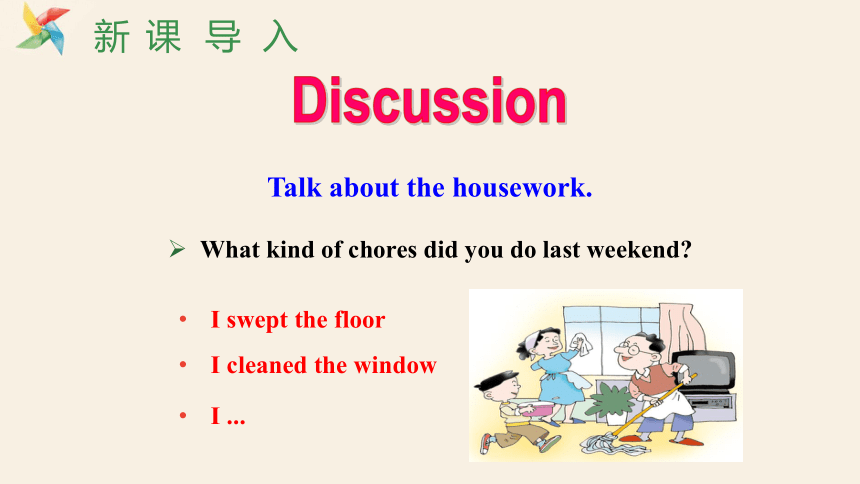

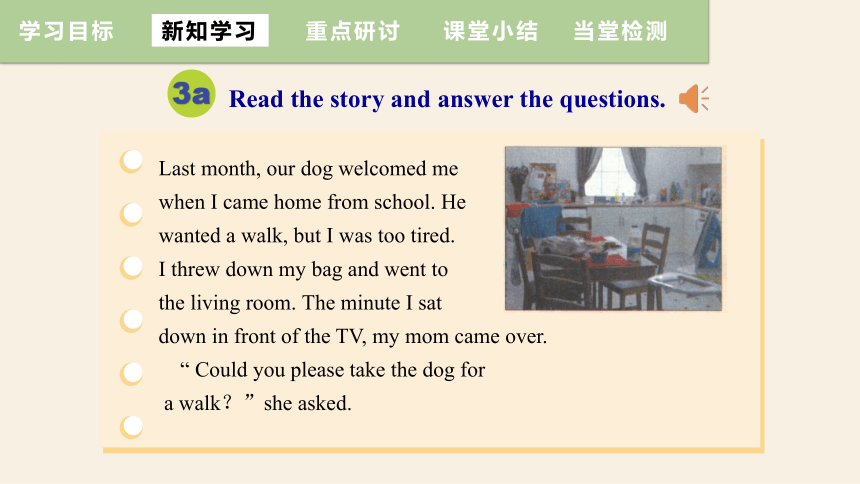
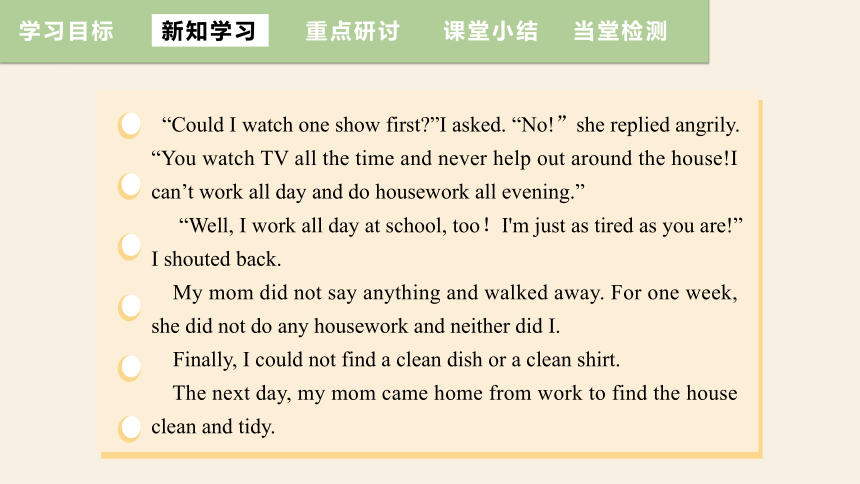

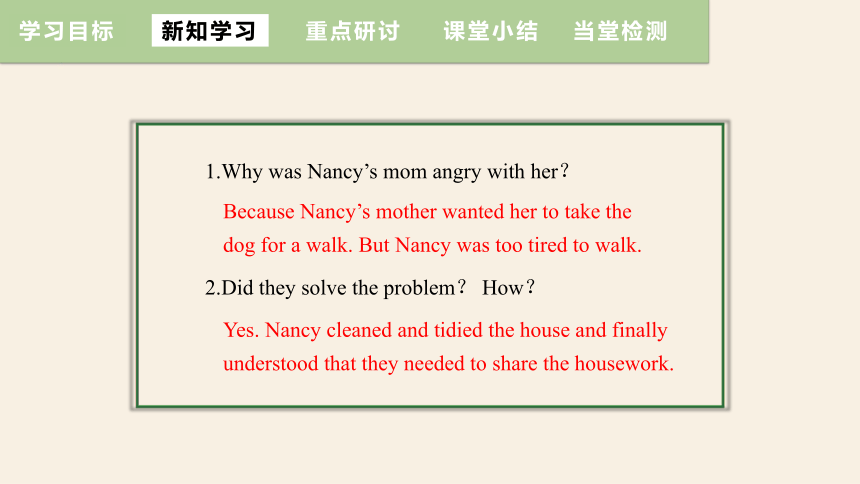
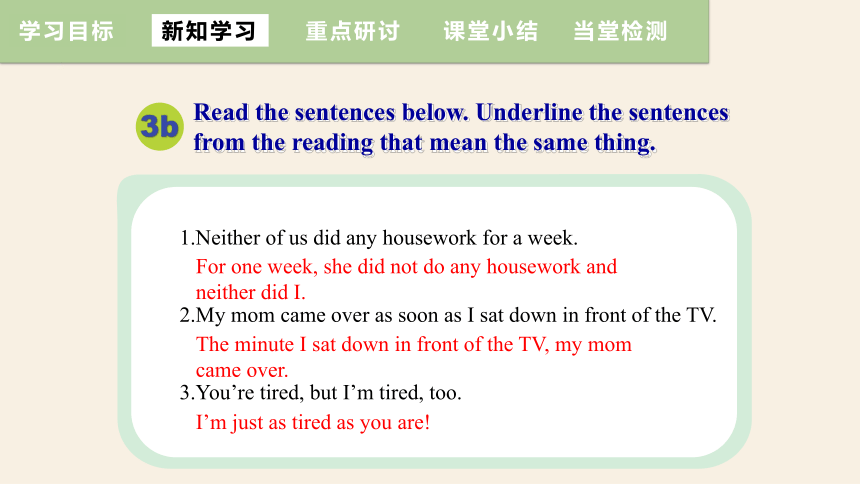
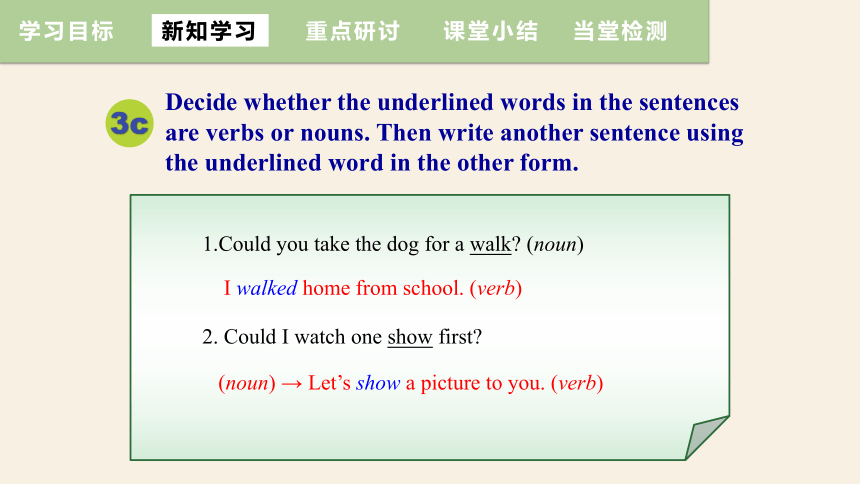
文档简介
(共20张PPT)
Unit 3
Could you please clean your room
Section A (3a~3c)
新
课
导
入
Discussion
Talk about the housework.
What kind of chores did you do last weekend
I swept the floor
I cleaned the window
I ...
Language Goal
新知学习
课堂小结
当堂检测
学习目标
重点研讨
1.能熟悉并正确运用本课时的重点单词及短语
2.能读懂文章,完成练习,了解Nancy和妈妈对做家务的态度
3.能掌握neither的用法
新知学习
课堂小结
当堂检测
学习目标
重点研讨
Read the story and answer the questions.
3a
Last month, our dog welcomed me
when I came home from school. He
wanted a walk, but I was too tired.
I threw down my bag and went to
the living room. The minute I sat
down in front of the TV, my mom came over.
“ Could you please take the dog for
a walk?”she asked.
新知学习
课堂小结
当堂检测
学习目标
重点研讨
“Could I watch one show first ”I asked. “No!”she replied angrily. “You watch TV all the time and never help out around the house!I can’t work all day and do housework all evening.”
“Well, I work all day at school, too!I'm just as tired as you are!” I shouted back.
My mom did not say anything and walked away. For one week, she did not do any housework and neither did I.
Finally, I could not find a clean dish or a clean shirt.
The next day, my mom came home from work to find the house clean and tidy.
新知学习
课堂小结
当堂检测
学习目标
重点研讨
“What happened ” she asked in surprise.
“I’m so sorry, Mom. I finally understand that we need to share the housework to have a clean and comfortable home, ”I replied.
新知学习
课堂小结
当堂检测
学习目标
重点研讨
1.Why was Nancy’s mom angry with her?
2.Did they solve the problem? How?
Because Nancy’s mother wanted her to take the
dog for a walk. But Nancy was too tired to walk.
Yes. Nancy cleaned and tidied the house and finally understood that they needed to share the housework.
新知学习
课堂小结
当堂检测
学习目标
重点研讨
Read the sentences below. Underline the sentences from the reading that mean the same thing.
3b
1.Neither of us did any housework for a week.
2.My mom came over as soon as I sat down in front of the TV.
3.You’re tired, but I’m tired, too.
For one week, she did not do any housework and neither did I.
The minute I sat down in front of the TV, my mom
came over.
I’m just as tired as you are!
新知学习
课堂小结
当堂检测
学习目标
重点研讨
3c
Decide whether the underlined words in the sentences are verbs or nouns. Then write another sentence using the underlined word in the other form.
1.Could you take the dog for a walk (noun)
2. Could I watch one show first
I walked home from school. (verb)
(noun) → Let’s show a picture to you. (verb)
新知学习
课堂小结
当堂检测
学习目标
重点研讨
3. I can’t work all day.
4. You watch TV all the time.
5. “What happened ” she asked in surprise.
(verb) → It’s difficult to find work in this city. (noun)
(verb) → How much is that watch (noun)
(noun) → It won’t surprise me if he loses the exam. (verb)
新知学习
课堂小结
当堂检测
学习目标
重点研讨
Language points
1. You watch TV all the time and ...
all the time(在该段时间内)一直;向来, 一向;时时刻刻;每时每刻
e.g. I do this all the time.
我一直是这么做的。
This happens all the time.
这种情况是时时发生的。
新知学习
课堂小结
当堂检测
学习目标
重点研讨
2. I’m just as tired as you are!
as ... as 意为 “和……一样” ,表示同级的比较。使用时要注意第一个as为副词,第二个as为连词。其基本结构为:as + adj./ adv. + as。
e.g. This film is as interesting as that one.
这部电影和那部电影一样有趣。
Your pen writes as smoothly as mine.
你的钢笔书写起来和我的一样流畅。
新知学习
课堂小结
当堂检测
学习目标
重点研讨
as … as 的否定形式为 “not as/so + adj./adv. + as”。
e.g. He didn’t act as well as you.
他表现得不如你好。
3. For one week, she did not do any housework and neither did I.
neither的意思是(两者间的任意一个)都不,也不,表示否定。当它作为形容词时,后面要接可数名词单数,谓语动词要用单数形式;当它作为副词时,后面的句子通常要倒装;当它作为代词时,后面要与of+名词/代词复数使用;当它作为连词时,通常与nor连用,并且谓语动词应与离它最近的主语在人称和数上保持一致,也就是遵循“就近一致”的原则。
新知学习
课堂小结
当堂检测
学习目标
重点研讨
e.g. — I don’t like this dress. 我不喜欢这件连衣裙。
— Neither / Nor do I. 我也不喜欢。
注意:neither 之后的主语要置于助动词或系动词之后。
neither 用作代词,表示“两者都不,双方均不”。
e.g. He answered neither of the letters. 他两封信都没回。
— Which one would you like 你喜欢哪一个?
— Neither. 两个都不喜欢。
新知学习
课堂小结
当堂检测
学习目标
重点研讨
also, too, either, neither的用法
1. also 是比较正式的用语,语气较庄重。它通常放在句中,位于行为动词之前,连系动词之后; 如有助动词或情态动词,一般放在助动词或情态动词之后。
e.g. Peter also has two brothers. 彼得也有两个兄弟。
I am also a student. 我也是一名学生。
Mrs. Green can also sing the song in Chinese.
格林夫人也能用汉语唱这首歌。
新知学习
课堂小结
当堂检测
学习目标
重点研讨
2. too 是普通用词,多用于口语,语气较随便。一般用在肯定句中,放在句末。
e.g. I’m in Row 1, too. 我也在第一排。
注意:also和too一般都用于肯定句, 很少用于否定句。
3. either 表示“也”时,一般只用于否定句,且置于句末。
e.g. I don’t know him. Tom doesn’t know him, either.
我不认识他,汤姆也不认识他。
If you don’t go there, he won’t go there, either.
如果你不去那儿,他也不会去那儿。
注意:either 本身没有否定的意义。所以多与 not 连用。
新知学习
课堂小结
当堂检测
学习目标
重点研讨
4. neither 表示“两个都不”,它作主语时,谓语动词常用单数。
e.g. Neither of you can do it.
你们两个都不能做这件事。
新知学习
课堂小结
当堂检测
学习目标
重点研讨
Unit 3
Section A (3a~3c)
重点短语:
__________________________________
__________________________________
__________________________________
all the time
in surprise
be angry with
take the dog for a walk
come over
throw down
take the dog for a walk
neither的用法:
neither的意思是1.________________________________,表示2._____。当它作为形容词时,后面要接3._______________,谓语动词要用4._____形式;当它作为副词时,后面的句子通常要5._____;当它作为代词时,后面要与6.________________使用;当它作为连词时,通常与7._____连用,并且谓语动词应与8.__________________________上保持一致,也就是遵循“就近一致”的原则。
(两者间的任意一个)都不,也不
否定
可数名词单数
单数
倒装
of+名词/代词复数
nor
离它最近的主语在人称和数
新知学习
课堂小结
当堂检测
学习目标
重点研讨
一、根据句意及首字母提示补全单词。
1. The thief t______ down all the things and ran away when he saw the police.
2. — Cathy can't ride a bike.
— N______ can her sister Cindy.
3. My brother works in a company, he wears a clean s____ to work on weekdays.
4.“What happened?”my mother asked in s______.
5.“Stop fighting!”the teacher shouted a______.
hrew
either
urprise
hirt
ngrily
新知学习
课堂小结
当堂检测
学习目标
重点研讨
二、根据句意,用括号中所给单词的适当形式填空。
1. ________ (final), they took the advice.
2. He didn't say ________ (something) and walked away.
3. —Where is the rubbish
—I ________ (take) it out 5 minutes ago.
4. My mother shouted ________ (angry) at me,
“Don't play computer games!”
5. Helen is going to talk with you as soon as she ________ (finish) her work.
took
Finally
anything
angrily
finishes
Unit 3
Could you please clean your room
Section A (3a~3c)
新
课
导
入
Discussion
Talk about the housework.
What kind of chores did you do last weekend
I swept the floor
I cleaned the window
I ...
Language Goal
新知学习
课堂小结
当堂检测
学习目标
重点研讨
1.能熟悉并正确运用本课时的重点单词及短语
2.能读懂文章,完成练习,了解Nancy和妈妈对做家务的态度
3.能掌握neither的用法
新知学习
课堂小结
当堂检测
学习目标
重点研讨
Read the story and answer the questions.
3a
Last month, our dog welcomed me
when I came home from school. He
wanted a walk, but I was too tired.
I threw down my bag and went to
the living room. The minute I sat
down in front of the TV, my mom came over.
“ Could you please take the dog for
a walk?”she asked.
新知学习
课堂小结
当堂检测
学习目标
重点研讨
“Could I watch one show first ”I asked. “No!”she replied angrily. “You watch TV all the time and never help out around the house!I can’t work all day and do housework all evening.”
“Well, I work all day at school, too!I'm just as tired as you are!” I shouted back.
My mom did not say anything and walked away. For one week, she did not do any housework and neither did I.
Finally, I could not find a clean dish or a clean shirt.
The next day, my mom came home from work to find the house clean and tidy.
新知学习
课堂小结
当堂检测
学习目标
重点研讨
“What happened ” she asked in surprise.
“I’m so sorry, Mom. I finally understand that we need to share the housework to have a clean and comfortable home, ”I replied.
新知学习
课堂小结
当堂检测
学习目标
重点研讨
1.Why was Nancy’s mom angry with her?
2.Did they solve the problem? How?
Because Nancy’s mother wanted her to take the
dog for a walk. But Nancy was too tired to walk.
Yes. Nancy cleaned and tidied the house and finally understood that they needed to share the housework.
新知学习
课堂小结
当堂检测
学习目标
重点研讨
Read the sentences below. Underline the sentences from the reading that mean the same thing.
3b
1.Neither of us did any housework for a week.
2.My mom came over as soon as I sat down in front of the TV.
3.You’re tired, but I’m tired, too.
For one week, she did not do any housework and neither did I.
The minute I sat down in front of the TV, my mom
came over.
I’m just as tired as you are!
新知学习
课堂小结
当堂检测
学习目标
重点研讨
3c
Decide whether the underlined words in the sentences are verbs or nouns. Then write another sentence using the underlined word in the other form.
1.Could you take the dog for a walk (noun)
2. Could I watch one show first
I walked home from school. (verb)
(noun) → Let’s show a picture to you. (verb)
新知学习
课堂小结
当堂检测
学习目标
重点研讨
3. I can’t work all day.
4. You watch TV all the time.
5. “What happened ” she asked in surprise.
(verb) → It’s difficult to find work in this city. (noun)
(verb) → How much is that watch (noun)
(noun) → It won’t surprise me if he loses the exam. (verb)
新知学习
课堂小结
当堂检测
学习目标
重点研讨
Language points
1. You watch TV all the time and ...
all the time(在该段时间内)一直;向来, 一向;时时刻刻;每时每刻
e.g. I do this all the time.
我一直是这么做的。
This happens all the time.
这种情况是时时发生的。
新知学习
课堂小结
当堂检测
学习目标
重点研讨
2. I’m just as tired as you are!
as ... as 意为 “和……一样” ,表示同级的比较。使用时要注意第一个as为副词,第二个as为连词。其基本结构为:as + adj./ adv. + as。
e.g. This film is as interesting as that one.
这部电影和那部电影一样有趣。
Your pen writes as smoothly as mine.
你的钢笔书写起来和我的一样流畅。
新知学习
课堂小结
当堂检测
学习目标
重点研讨
as … as 的否定形式为 “not as/so + adj./adv. + as”。
e.g. He didn’t act as well as you.
他表现得不如你好。
3. For one week, she did not do any housework and neither did I.
neither的意思是(两者间的任意一个)都不,也不,表示否定。当它作为形容词时,后面要接可数名词单数,谓语动词要用单数形式;当它作为副词时,后面的句子通常要倒装;当它作为代词时,后面要与of+名词/代词复数使用;当它作为连词时,通常与nor连用,并且谓语动词应与离它最近的主语在人称和数上保持一致,也就是遵循“就近一致”的原则。
新知学习
课堂小结
当堂检测
学习目标
重点研讨
e.g. — I don’t like this dress. 我不喜欢这件连衣裙。
— Neither / Nor do I. 我也不喜欢。
注意:neither 之后的主语要置于助动词或系动词之后。
neither 用作代词,表示“两者都不,双方均不”。
e.g. He answered neither of the letters. 他两封信都没回。
— Which one would you like 你喜欢哪一个?
— Neither. 两个都不喜欢。
新知学习
课堂小结
当堂检测
学习目标
重点研讨
also, too, either, neither的用法
1. also 是比较正式的用语,语气较庄重。它通常放在句中,位于行为动词之前,连系动词之后; 如有助动词或情态动词,一般放在助动词或情态动词之后。
e.g. Peter also has two brothers. 彼得也有两个兄弟。
I am also a student. 我也是一名学生。
Mrs. Green can also sing the song in Chinese.
格林夫人也能用汉语唱这首歌。
新知学习
课堂小结
当堂检测
学习目标
重点研讨
2. too 是普通用词,多用于口语,语气较随便。一般用在肯定句中,放在句末。
e.g. I’m in Row 1, too. 我也在第一排。
注意:also和too一般都用于肯定句, 很少用于否定句。
3. either 表示“也”时,一般只用于否定句,且置于句末。
e.g. I don’t know him. Tom doesn’t know him, either.
我不认识他,汤姆也不认识他。
If you don’t go there, he won’t go there, either.
如果你不去那儿,他也不会去那儿。
注意:either 本身没有否定的意义。所以多与 not 连用。
新知学习
课堂小结
当堂检测
学习目标
重点研讨
4. neither 表示“两个都不”,它作主语时,谓语动词常用单数。
e.g. Neither of you can do it.
你们两个都不能做这件事。
新知学习
课堂小结
当堂检测
学习目标
重点研讨
Unit 3
Section A (3a~3c)
重点短语:
__________________________________
__________________________________
__________________________________
all the time
in surprise
be angry with
take the dog for a walk
come over
throw down
take the dog for a walk
neither的用法:
neither的意思是1.________________________________,表示2._____。当它作为形容词时,后面要接3._______________,谓语动词要用4._____形式;当它作为副词时,后面的句子通常要5._____;当它作为代词时,后面要与6.________________使用;当它作为连词时,通常与7._____连用,并且谓语动词应与8.__________________________上保持一致,也就是遵循“就近一致”的原则。
(两者间的任意一个)都不,也不
否定
可数名词单数
单数
倒装
of+名词/代词复数
nor
离它最近的主语在人称和数
新知学习
课堂小结
当堂检测
学习目标
重点研讨
一、根据句意及首字母提示补全单词。
1. The thief t______ down all the things and ran away when he saw the police.
2. — Cathy can't ride a bike.
— N______ can her sister Cindy.
3. My brother works in a company, he wears a clean s____ to work on weekdays.
4.“What happened?”my mother asked in s______.
5.“Stop fighting!”the teacher shouted a______.
hrew
either
urprise
hirt
ngrily
新知学习
课堂小结
当堂检测
学习目标
重点研讨
二、根据句意,用括号中所给单词的适当形式填空。
1. ________ (final), they took the advice.
2. He didn't say ________ (something) and walked away.
3. —Where is the rubbish
—I ________ (take) it out 5 minutes ago.
4. My mother shouted ________ (angry) at me,
“Don't play computer games!”
5. Helen is going to talk with you as soon as she ________ (finish) her work.
took
Finally
anything
angrily
finishes
同课章节目录
- Unit 1 What's the matter?
- Section A
- Section B
- Unit 2 I'll help to clean up the city parks.
- Section A
- Section B
- Unit 3 Could you please clean your room?
- Section A
- Section B
- Unit 4 Why don't you talk to your parents?
- Section A
- Section B
- Unit 5 What were you doing when the rainstorm came
- Section A
- Section B
- Review of Units 1-5
- Unit 6 An old man tried to move the mountains.
- Section A
- Section B
- Unit 7 What's the highest mountain in the world?
- Section A
- Section B
- Unit 8 Have you read Treasure Island yet?
- Section A
- Section B
- Unit 9 Have you ever been to a museum?
- Section A
- Section B
- Unit 10 I've had this bike for three years.
- Section A
- Section B
